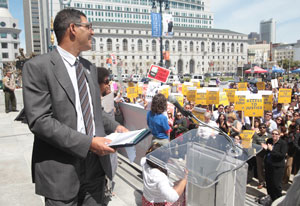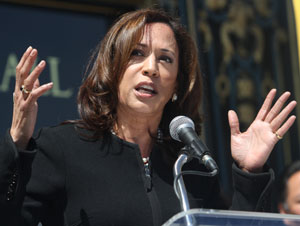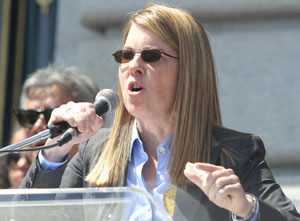Legal
community rails against budget cuts
By Laura Ernde
Staff Writer
SAN FRANCISCO – Former California Supreme Court Justice
Carlos R. Moreno watched countless protests take place outside his office in
Civic Center Plaza when he was on the court. He never imagined that one day
he’d be a participant, he said.
 |
State Bar President Jon Streeter addresses a crowd estimated at 500 people on the steps of San Francisco City Hall on April 18.
Photos by Mathew Sumner
|
But on April 18, Moreno and people from all corners of the
legal community turned out by the hundreds on the steps of San Francisco City
Hall to call for the restoration of trial court funding. In four years, state
lawmakers have slashed $650 million from the judicial branch’s budget and
budget talks are once again heating up in Sacramento.
With no more one-time funding shifts to rely on, the fiscal
crisis has come to a head. The courts are facing the possibility of another
$125 million cut in 2012-13 if voters do not approve temporary sales and income
tax increases Gov. Jerry Brown is seeking to place on the November ballot.
Staff layoffs, closed courtrooms and longer waits for
service are hurting access to justice particularly for the poorest and most
vulnerable members of society, said the speakers, who included judges, lawyers,
policymakers and court employees.
“We are so far past (cutting) the fat, people. We are into
the bone,” said Kelly Dermody, president of the Bar Association of San
Francisco, which helped organize the rally.
 |
| Attorney General Kamala Harris |
Attorney General Kamala Harris said adequate court funding
is essential so people have a place to go when their basic rights are in
jeopardy. She urged the crowd to support “reasonable measures to bring
resources into the state budget.”
State Bar President Jon Streeter said the justice system is
threatened “to an extent we have never seen in our professional lives” and
warned of violence if people are turned away from the courthouse and take
matters in to their own hands.
State Bar Executive Director Joseph L. Dunn, a former state
senator, said lawmakers’ understanding of the role of the judiciary in society
hit a low 10 years ago and is even lower today.
“It’s not that they’re bad people,” he said. “They need us
to raise a voice in support of the judiciary.”
A volunteer group calling itself the Open Courts Coalition
is spearheading the lobbying efforts. Prominent plaintiffs’ attorneys Paul R.
Kiesel and Niall McCarthy chair the 17-member steering committee, which
includes Streeter, Alameda County District Attorney Nancy O’Malley, Public
Counsel CEO Hernan Vera, Morrison & Foerster attorney James Brosnahan and
insurance defense lawyer Edith Matthai.
In addition to sparking rallies in San Francisco and Los
Angeles, the coalition has produced a video featuring Harris,
Chief Justice Tani Cantil-Sakauye, former governors Gray Davis and George
Deukmejian, and others. The steering committee has enlisted 200 legal
organizations across the state to personally visit lawmakers and send letters
and emails to get their message across.
The cuts are disproportionally hitting the most vulnerable
people in society, legal aid lawyers said.
Domestic violence victims are having trouble getting
restraining orders. A 94-year-old man was mistakenly evicted from his home
because a judge’s order staying the eviction wasn’t delivered on time due to
budget cuts, said Tirien Steinbach, executive director of the nonprofit East
Bay Community Law Center.
While wealthy litigants can afford to hire arbitrators to
resolve their disputes, those without the means must compete for scarce court
time. As the crisis drags on, cases could be vulnerable to dismissal under a
rule that requires a trial within five years.
 |
| Kelly Dermody, President of the Bar Association of San Francisco |
Court cuts have reached the highest levels as well. In
March, the Judicial Council, the statewide policymaking body for the courts,
halted work on a plan to link up computer case management systems statewide.
In April, the council voted to reconsider $1.1 billion worth
of courthouse construction projects. The judicial branch will look into scaling
down the projects, renovating existing courthouses, leasing space and using
lower-cost construction methods to achieve savings.
Affected projects are: El Centro Family Courthouse in
Imperial County; Inyo County Courthouse; Delano and Mojave courthouses in Kern
County; Eastlake Juvenile Courthouse, Glendale, Santa Clarita and Southeast Los
Angeles courthouses in Los Angeles County; Ukiah Courthouse in Mendocino
County, South Monterey County Courthouse in Monterey County; Nevada City
Courthouse in Nevada County; Hemet Courthouse in Riverside County; and Santa
Barbara Criminal Courthouse in Santa Barbara County.
Compounding the court funding crisis, money for legal aid
services for the poor has bottomed out in recent years from $22 million to less
than $7 million. Much of the money comes from interest charged to attorney
trust accounts and interest rates are at historic lows with no sign of
changing.
The funding crisis has brought together lawyers who are
usually adversaries in the courtroom.
“It is clear that everyone benefits from our courts being
open and providing a full range of services,” 3rd District Court of Appeal
Justice Ronald Robie recently told a group of Northern California lawyers who
gathered in Grass Valley. “There is no place today for old stereotypes.”